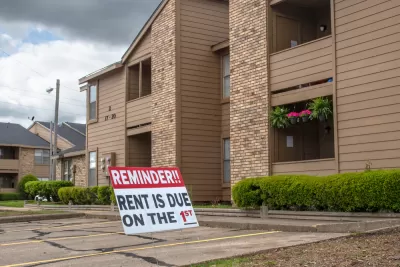Without rent relief from Congress, the recent wave of evictions could become a tsunami, according to housing advocates.

Diane Yentel, president and CEO of the National Low Income Housing Coalition, took to Twitter this week to share news on the growing number of evictions around the country—an outcome feared since the outset of the pandemic. A clear narrative that emerges from the examples Yentel gathers from around the country: the eviction crisis we've been warned about since March is actually already here.
- 9,000 eviction hearings stalled by coronavirus resume Monday. Advocates say it's the beginning of a crisis (June 14, 2020)
- Predicted surge comes true: Eviction filings jump over 40% in Milwaukee County and state (Milwaukee Journal Sentinel, June 15, 2020)
- Despite available COVID-19 reprieve, Pima County evictions uneven, frequent (Tuscon.com, June 16, 2020)
- The Columbus Convention Center Is Now a Pandemic Housing Court (Bloomberg CityLab, June 18, 2020)
- Coronavirus: Why US is expecting an 'avalanche' of evictions (BBC News, June 19, 2020)
- Landlords suing for $4M in unpaid rent as Harris County evictions move forward (Houston Business Journal, June 22, 2020)
Yentel's response to this wave of bad news for U.S. renters is clear, calling on Congress to approve the housing relief actions included in the Health and Economic Recovery Omnibus Emergency Solutions Act (HEROES Act) approved by the House in May and waiting for Senate action, which includes a broad eviction moratorium, $100 billion in rent relief, and $11.5 billion for homeless programs.
FULL STORY: That wave of evictions and spike in homelessness that we’ve been warning about for months? It’s starting.

Maui's Vacation Rental Debate Turns Ugly
Verbal attacks, misinformation campaigns and fistfights plague a high-stakes debate to convert thousands of vacation rentals into long-term housing.

Planetizen Federal Action Tracker
A weekly monitor of how Trump’s orders and actions are impacting planners and planning in America.

San Francisco Suspends Traffic Calming Amidst Record Deaths
Citing “a challenging fiscal landscape,” the city will cease the program on the heels of 42 traffic deaths, including 24 pedestrians.

Defunct Pittsburgh Power Plant to Become Residential Tower
A decommissioned steam heat plant will be redeveloped into almost 100 affordable housing units.

Trump Prompts Restructuring of Transportation Research Board in “Unprecedented Overreach”
The TRB has eliminated more than half of its committees including those focused on climate, equity, and cities.

Amtrak Rolls Out New Orleans to Alabama “Mardi Gras” Train
The new service will operate morning and evening departures between Mobile and New Orleans.
Urban Design for Planners 1: Software Tools
This six-course series explores essential urban design concepts using open source software and equips planners with the tools they need to participate fully in the urban design process.
Planning for Universal Design
Learn the tools for implementing Universal Design in planning regulations.
Heyer Gruel & Associates PA
JM Goldson LLC
Custer County Colorado
City of Camden Redevelopment Agency
City of Astoria
Transportation Research & Education Center (TREC) at Portland State University
Jefferson Parish Government
Camden Redevelopment Agency
City of Claremont



























